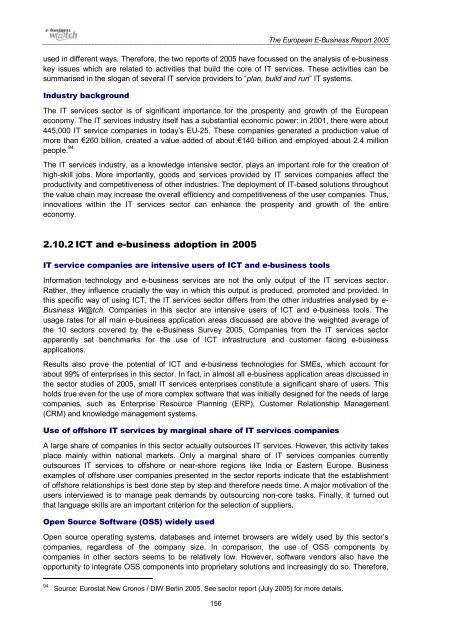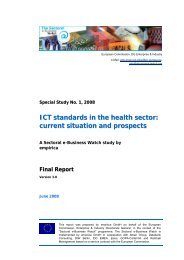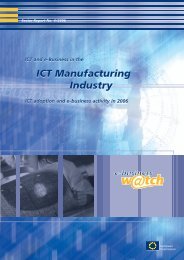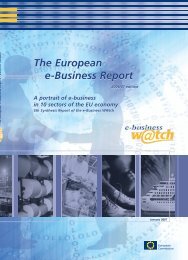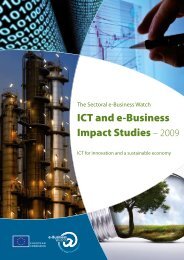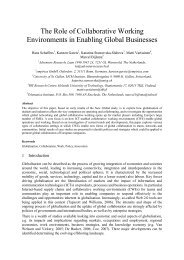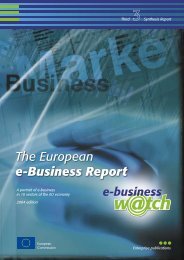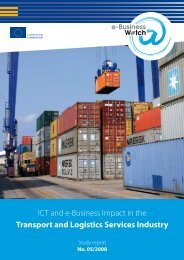The European e-Business Report The European e ... - empirica
The European e-Business Report The European e ... - empirica
The European e-Business Report The European e ... - empirica
Create successful ePaper yourself
Turn your PDF publications into a flip-book with our unique Google optimized e-Paper software.
<strong>The</strong> <strong>European</strong> E-<strong>Business</strong> <strong>Report</strong> 2005<br />
used in different ways. <strong>The</strong>refore, the two reports of 2005 have focussed on the analysis of e-business<br />
key issues which are related to activities that build the core of IT services. <strong>The</strong>se activities can be<br />
summarised in the slogan of several IT service providers to “plan, build and run” IT systems.<br />
Industry background<br />
<strong>The</strong> IT services sector is of significant importance for the prosperity and growth of the <strong>European</strong><br />
economy. <strong>The</strong> IT services industry itself has a substantial economic power: in 2001, there were about<br />
445,000 IT service companies in today’s EU-25. <strong>The</strong>se companies generated a production value of<br />
more than €260 billion, created a value added of about €140 billion and employed about 2.4 million<br />
people. 94<br />
<strong>The</strong> IT services industry, as a knowledge intensive sector, plays an important role for the creation of<br />
high-skill jobs. More importantly, goods and services provided by IT services companies affect the<br />
productivity and competitiveness of other industries. <strong>The</strong> deployment of IT-based solutions throughout<br />
the value chain may increase the overall efficiency and competitiveness of the user companies. Thus,<br />
innovations within the IT services sector can enhance the prosperity and growth of the entire<br />
economy.<br />
2.10.2 ICT and e-business adoption in 2005<br />
IT service companies are intensive users of ICT and e-business tools<br />
Information technology and e-business services are not the only output of the IT services sector.<br />
Rather, they influence crucially the way in which this output is produced, promoted and provided. In<br />
this specific way of using ICT, the IT services sector differs from the other industries analysed by e-<br />
<strong>Business</strong> W@tch. Companies in this sector are intensive users of ICT and e-business tools. <strong>The</strong><br />
usage rates for all main e-business application areas discussed are above the weighted average of<br />
the 10 sectors covered by the e-<strong>Business</strong> Survey 2005. Companies from the IT services sector<br />
apparently set benchmarks for the use of ICT infrastructure and customer facing e-business<br />
applications.<br />
Results also prove the potential of ICT and e-business technologies for SMEs, which account for<br />
about 99% of enterprises in this sector. In fact, in almost all e-business application areas discussed in<br />
the sector studies of 2005, small IT services enterprises constitute a significant share of users. This<br />
holds true even for the use of more complex software that was initially designed for the needs of large<br />
companies, such as Enterprise Resource Planning (ERP), Customer Relationship Management<br />
(CRM) and knowledge management systems.<br />
Use of offshore IT services by marginal share of IT services companies<br />
A large share of companies in this sector actually outsources IT services. However, this activity takes<br />
place mainly within national markets. Only a marginal share of IT services companies currently<br />
outsources IT services to offshore or near-shore regions like India or Eastern Europe. <strong>Business</strong><br />
examples of offshore user companies presented in the sector reports indicate that the establishment<br />
of offshore relationships is best done step by step and therefore needs time. A major motivation of the<br />
users interviewed is to manage peak demands by outsourcing non-core tasks. Finally, it turned out<br />
that language skills are an important criterion for the selection of suppliers.<br />
Open Source Software (OSS) widely used<br />
Open source operating systems, databases and internet browsers are widely used by this sector’s<br />
companies, regardless of the company size. In comparison, the use of OSS components by<br />
companies in other sectors seems to be relatively low. However, software vendors also have the<br />
opportunity to integrate OSS components into proprietary solutions and increasingly do so. <strong>The</strong>refore,<br />
94<br />
Source: Eurostat New Cronos / DIW Berlin 2005. See sector report (July 2005) for more details.<br />
156


